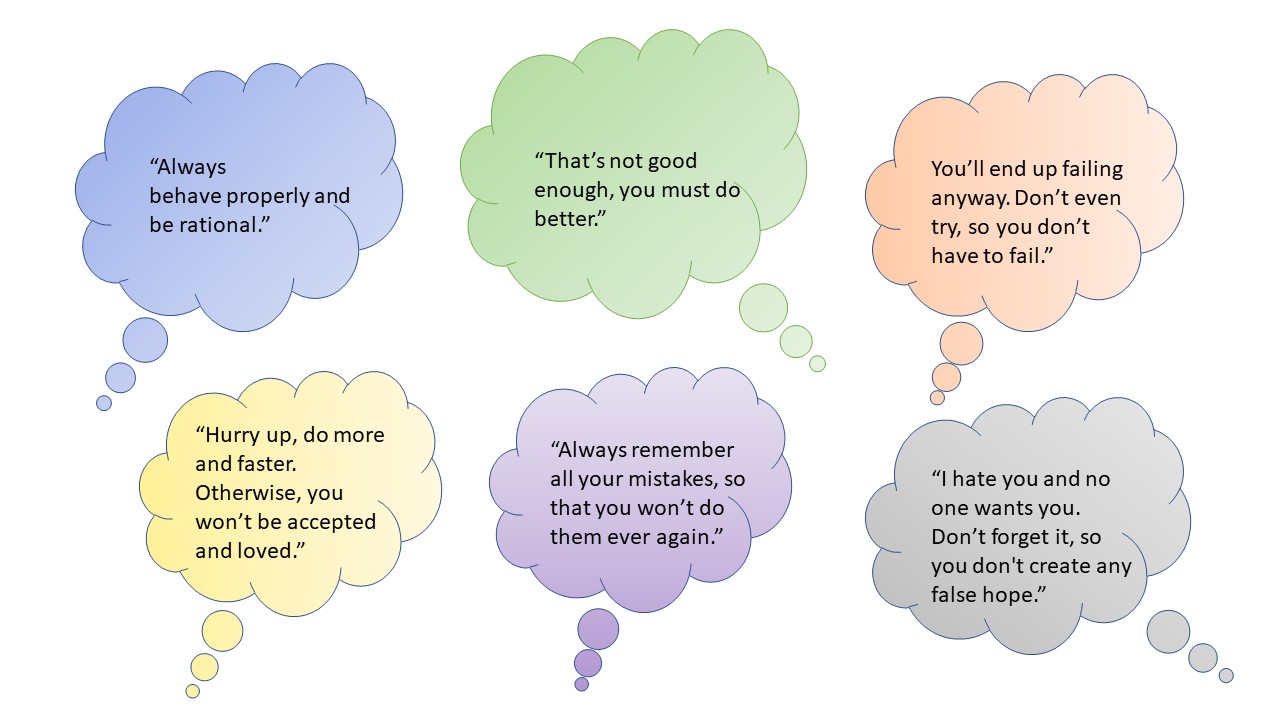CS-CV0005 - Mind & Study - toolbox for being well in studies, Lectures, 26.2.2024-21.4.2024
Kurssiasetusten perusteella kurssi on päättynyt 21.04.2024 Etsi kursseja: CS-CV0005
What does my self-critical self want?
Are you your own best friend or worst enemy?
Sometimes situations that don't go as you hoped, don’t just evoke difficult emotions and feelings, but also cause self-critical thoughts that can even strengthen those difficult feelings. Indeed, many of us can recognize recurring self-critical thoughts, something we can maybe name as an “inner voice”, inner critic. It's as if we were accompanied by a self-critic who questions our actions, prevents us from enjoying things, scolds or commands.
The video below shows an example of self-critical inner speech:
What does my self-critical self want?
Sometimes when trying to reduce self-critical thinking, we try to get rid of it completely. However, that is unrealistic. Instead, one can learn to have dialogue and listen to what that self-critical inner voice wants to achieve.
Self-criticism may have good intentions, even if it doesn’t always sound that way. Your self-critical frame of mind may have noticed a threat looming ahead (for example, a potential failure at something). It may be trying to give you advice in order to avoid the threat. Unfortunately, this core message may remain unheeded, for self-criticism’s style of communicating is often aggressive and accusatory. The underlying intention may be good, but the implementation is not constructive.
By engaging in a dialogue with your self-critical state of mind, you can start to form a new relationship with it. The dialogue may even help you see solutions and learning opportunities. Little by little, it is possible to learn to use self-criticism as a form of constructive criticism. The next table shows a comparison between self-criticism and constructive criticism. If you were hiring a personal trainer, which one would you choose?
Self-criticism | Constructive criticism |
Focusses on traits and things that cannot be changed. | Focusses on behaviour or practical things that can be changed. |
Is hostile or unpleasant | Is warm-hearted and kind |
Puts you down and causes despair | Encourages and gives hope |
Is unclear and does not tell you what you should change | Gives clear examples and tells you what you should do differently in the future |
Types of self-criticism
Research has found different typical types of self-criticism. Do you recognize one of these or maybe more?

In the next section, we will be searching for compassionate voice and ways to strengthen that. However, if you have noticed that your inner critic is often loud and very harsh, or you recognized that the thoughts of the gray bubble are present in your daily-life, you could also benefit from the guidance of a professional in finding ways to face the inner critic and reduce its power, in addition to self-study-materials. In that case, please contact, for example, the wellbeing-staff at Starting Point of Wellbeing:
Starting Point of Wellbeing | Aalto University